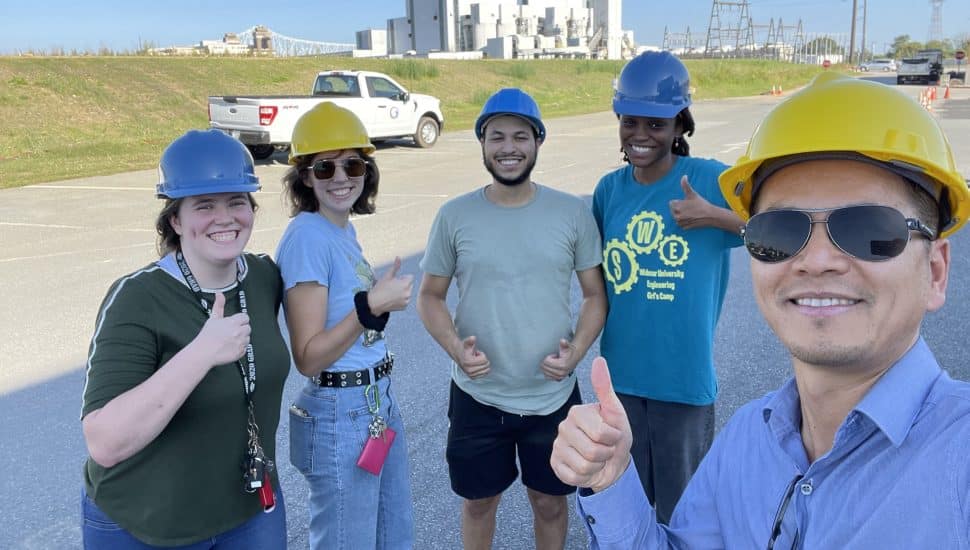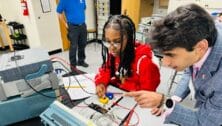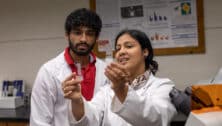Widener Engineering Awarded Nearly $280,000 in Grants to Advance Innovation Across Industries

Faculty in Widener University’s School of Engineering have been awarded grants from federal and state institutions designed to advance student research experiences and industry innovations.
The grants total nearly $280,000 and represent research conducted in the fields of mechanical, electrical, and civil engineering.
The following grant awards were distributed.
Environmental Protection Agency, P3 Program
Xiaochao Tang, associate professor of civil engineering
Funding through the EPA’s People, Prosperity, and the Planet (P3) Program supports undergraduate research to develop innovative solutions that address environmental and public health challenges.
Tang was awarded approximately $75,000 to lead a two-year project to develop geopolymer cement using sewage sludge ash as a precursor.
The project aims to develop a process that uses industrial byproducts to create a low-carbon sustainable cement product in an effort to reduce carbon emissions and solid waste that would otherwise be disposed of in landfills.
Senior engineering students will partner with the Delaware County Regional Water Quality Control Authority (DELCORA) in Chester, which will provide local sewage sludge ash as the precursor for developing the geopolymer cement.
If this process is successful, the geopolymer product will be used on a small scale to repair and rehabilitate non-structural municipal facilities.
Manufacturing PA Innovation Program
This initiative, which is partially funded by the Pennsylvania Department of Community and Economic Development, pairs graduate and undergraduate students with local manufacturers to develop new technologies and advance innovation statewide.
Three Widener engineering projects, which were awarded approximately $200,000 in total, have been selected to participate in the 2024 initiative.
1. Babak Eslami, associate professor, and Kamran Fouladi, associate professor and associate dean, mechanical engineering
Associate Professors Eslami and Fouladi are working with industrial partner American Additive Manufacturing to enhance the durability and repeatability of 3D printing with Polyeth-ether ketone (PEEK) polymer.
The Widener student-research team will model the industrial 3D printers used by American Additive Manufacturing to perform computational fluid dynamics studies and better understand flows around the parts.
Multi-scale material characterization will be performed on 3D-printed parts to develop the optimum printing condition for PEEK.
2. John Suarez, associate professor of electrical engineering
Associate Professor Suarez and his student-research team will develop a radio-frequency system for sensing roadway nonuniformities in front of vehicles.
The system is intended to operate in vehicles moving at relatively high speeds. The nonuniformities of greatest interest are potholes or other road defects that can damage vehicles or create unsafe conditions.

Suarez’s group will work with Dorman Products, an industry leader in aftermarket automotive products located in Colmar, Pennsylvania.
3. Xiaochao Tang, associate professor civil engineering, and Vicki Brown, professor of civil engineering
In addition to the EPA funding, Tang, alongside Professor Vicki Brown and student researchers, is supported by this state initiative to create a low-carbon sustainable alternative for concrete, the most widely used construction material.
Cement, a key component of concrete, is a highly energy-intensive product that releases a large amount of carbon dioxide when produced.
In collaboration with two partners, the Delaware County Reginal Water Quality Control Authority (DELCORA) in Chester and Conewago Manufacturing, LLC in Hanover, Pennsylvania, this project will utilize sewage sludge ash, a byproduct from DELCORA’s wastewater treatment facility, to create an inorganic polymer binding agent, known as geopolymer, at ambient or slightly elevated temperatures.
This project will potentially enable the repurposing of the ash, which would otherwise be disposed of in landfills, for beneficial reuse at scale.
The project will also utilize Conewago’s concrete mix and testing facility to characterize the geopolymer product and cast pilot scale test bed.
The Manufacturing PA project was financed [in part] by funding from the Commonwealth of Pennsylvania, Department of Community and Economic Development.
Widener University is a private institution that offers an agile, innovative, and inclusive approach to learning.
Industry-shaping faculty provide close, personal mentorship and share powerful connections that help students build professional networks.
Recognized as one of the Philadelphia region’s leading universities, Widener offers programs and experiences that empower our community of learners to discover and create better futures as scholars, leaders, and globally engaged citizens.
Join Our Community
Never miss a Delaware County story!
"*" indicates required fields




![95000-1023_ACJ_BannerAd[1]](https://delco.today/wp-content/uploads/sites/3/2023/03/95000-1023_ACJ_BannerAd1.jpg)


























